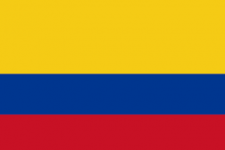Colombia in Space
 The Colombian Space Commission (CCE) is the gateway, through which, Colombia can achieve strengthening of knowledge of the Earth and Outer Space by means of coordination, agreement, and institutional and social participation (including modern technologies and the information provided by missions on Communications, Earth Observation and Satellite Navigation). This is carried out with the intention of increasing the productivity, efficiency and competitiveness of economic sectors that demand geospatial information. The CCE was created in light of the Presidential Decree 2442, July 2006 and the Colombian Air Force undertook the role of Executive Secretariat up until 2014.
The Colombian Space Commission (CCE) is the gateway, through which, Colombia can achieve strengthening of knowledge of the Earth and Outer Space by means of coordination, agreement, and institutional and social participation (including modern technologies and the information provided by missions on Communications, Earth Observation and Satellite Navigation). This is carried out with the intention of increasing the productivity, efficiency and competitiveness of economic sectors that demand geospatial information. The CCE was created in light of the Presidential Decree 2442, July 2006 and the Colombian Air Force undertook the role of Executive Secretariat up until 2014.
The Colombian Space Commission is the intersectoral instance of consultation, coordination, orientation and planning, which aims to guide the execution of the national policy for the development and application of space technologies; Strategic fields of work are articulated in areas such as: Telecommunications, Satellite Navigation, Astronautics, Astronomy and Aerospace Medicine, Knowledge Management, Political and Legal Affairs and Earth observation.
The latter is under the coordination of the Institute of Hydrology, Meteorology and Environmental Studies - IDEAM, which in turn is supported by the articulation of more than 20 institutions in the environmental sector, academia, and the private sector, which are producers or beneficiaries of information to starting from the use of space technologies in this field (Ministry of Environment and Sustainable Development, Ministry of Justice and Interior, Ministry of Agriculture and Rural Development, DNP, UNGRD, IGAC, DIMAR, ANH, FAC, SGC, INVEMAR, SINCHI, District Secretariat of Environment, PNNC, Corpoica, Corantioquía, CIF, Unv. Militar Nueva Granada, Unv. EAFIT, Unv. Sergio Arboleda, Pontificia Universidad Javeriana).
Implement the research program in satellite development and applications in the field of Earth Observation - PHASE I: Structuring the satellite research project in Colombia, which will allow establishing research capacities, advancing strengthening actions through international cooperation and obtaining the diagnosis of the subsequent phases and the long-term projection of satellite development in Colombia on the subject of Earth Observation.
-
Establish mechanisms that contribute to the consolidation of the research structure in satellite engineering in Colombia.
Evaluate and propose alternatives for the appropriation of satellite Earth Observation technologies.
Formulate a technical feasibility study for the installation of a Colombian Earth Observation satellite.
Strengthen coordination and cooperation relationships with various entities, especially with the academic and research sectors.
Propose strategies that promote technological development in the field of Earth Observation and the country's level of competitiveness in this field.
Operate within the framework of the Colombian Space Commission and contribute to its strengthening, by carrying out knowledge management actions on geospatial science and technology issues.
Cooperate in carrying out human talent training programs in the fields of satellite engineering and Earth Observation.
Support the preparation of technical-scientific materials that promote the transfer of knowledge and dissemination of project progress.
Carry out technical and / or scientific events (seminars, symposia, congresses, courses, forums and workshops) on the topics of the agreement.
José Gregorio Portilla wrote in 2016 that "This commission created to establish the country's space policy is adrift due to the lack of interest of the national government.... In an attempt to remedy the enormous backwardness of the country in terms of space issues, the Álvaro Uribe government, with Decree 2442 of 2006, created the Colombian Space Commission (CCE).... The CCE was intended as a first step to create a Colombian Space Agency, a kind of native NASA, with a defined budget that would allow it to channel and coordinate the efforts of various institutions interested in space issues. Ten long years have passed and yet an agency is nowhere to be seen. Worse still, today the commission has been inactive since late 2014."
The Agustín Codazzi Geographic Institute was the first to exercise the Executive Secretariat of the Commission and with it a short-term aerospace policy took shape. With a seriousness never before seen, in the country there was talk of the acquisition of a geostationary satellite (satellite 1) for communications (of which two tenders were held, which in the end were unsuccessful), as well as the acquisition of a Earth observation satellite (satellite 2). However, with the advent of the Juan M. Santos government, the acquisition of satellite 1 was canceled. The preference for fiber optic technology throughout the national territory was argued. So only the acquisition of satellite 2 was under study.
The Executive Secretariat came into the hands of the Colombian Air Force (FAC), which continued to support the acquisition of satellite 2. But in mid-2014, Santos and his new Vice President, Germán Vargas, decided to cancel the acquisition of that satellite, with the laughable argument that it was cheaper to buy photographs of the national territory from foreign suppliers.

|
NEWSLETTER
|
| Join the GlobalSecurity.org mailing list |
|
|
|

